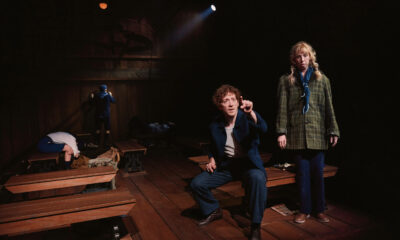Local News
Local MPs nominate additional Jewish community members for King Charles Coronation Medals

A few months back we published a story on this website about several members of the Jewish community who had been awarded King Charles Coronation Medals. That story can be found at King Charles Medals
Since that time it has come to our attention that several other members of our community had also been nominated by local Members of Parliament to receive medals.
Following is an update to that earlier story, which was also written by Myron Love:
The medal, created to mark the coronation of King Charles III, is described in a press release as a “special commemorative honour awarded to individuals who have demonstrated exceptional service and dedication to their communities and Canada through volunteerism, leadership, and acts of courage or commitment, reflecting the values of service and unity upheld by the monarchy. It serves as a lasting symbol of appreciation for their selfless efforts in building a better society”.
At the time, I was working largely from a list of local honorees posted on the Lieutenant-Governor’s webpage. Since then, it has been brought to my attention that other deserving members of our Jewish community have also been awarded the medals. It seems that it was not only the Lieutenant-Governor’s office which submitted a list of prospective honorees, It seems that every Member of Parliament was also encouraged to nominate honorees among their constituents.
Thus, local MPS Ben Carr and Marty Morantz –subsequent to the Lieutenant-Governor’s medal presentations – have released their own slates of medal recipients. Among the new Jewish honorees are two Jewish Federation of Winnipeg leaders – one fairly recently retired and a second who is still actively involved, a retired judge, a musician who has played a leading role in Winnipeg folk music circles, a pioneering veterinarian and a long time advocate for the disabled.
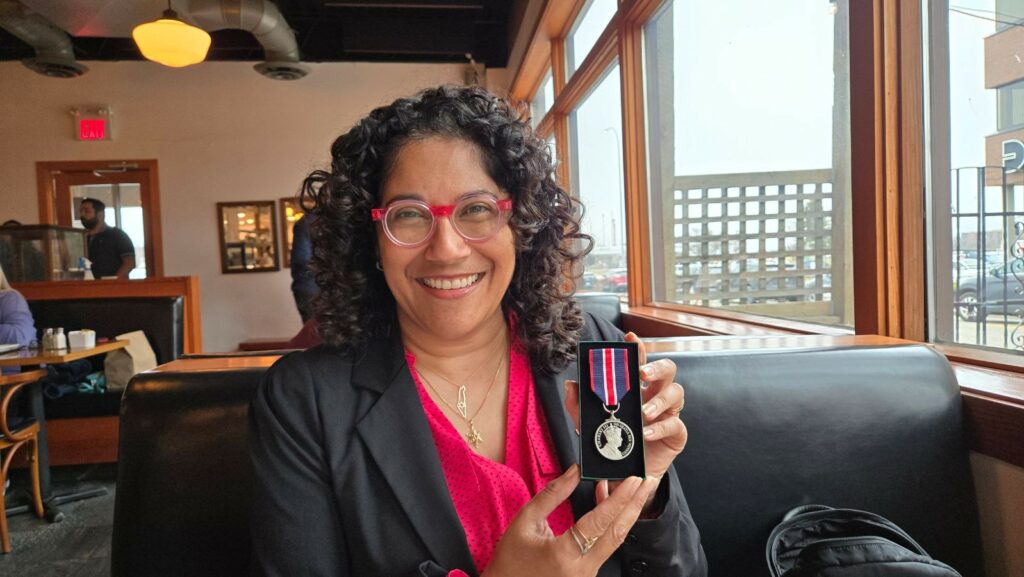
Jessica Cogan was actually presented with her medal (along with Einat Paz who appeared in the original story) – in mid-November in Marty Morantz’ constituency office. Cogan has been volunteering with the Jewish Federation of Winnipeg in numerous capacities for decades. Currently she is the Jewish Federation of Winnipeg’s Second Vice-President, a member of the board of Ben-Gurion University of the Negev, and a member of the advisory/organizing team for the Holocaust Memorial Sites Study Tour for Educators. She is a Past President of the Jewish National Fund (Manitoba-Saskatchewan branch) and National JNF board member, as well as a former Folklorama adult ambassador for Shalom Square.
In the wider community, she has served as a director of the Women’s Health Clinic Board and co-chaired their capital campaign.
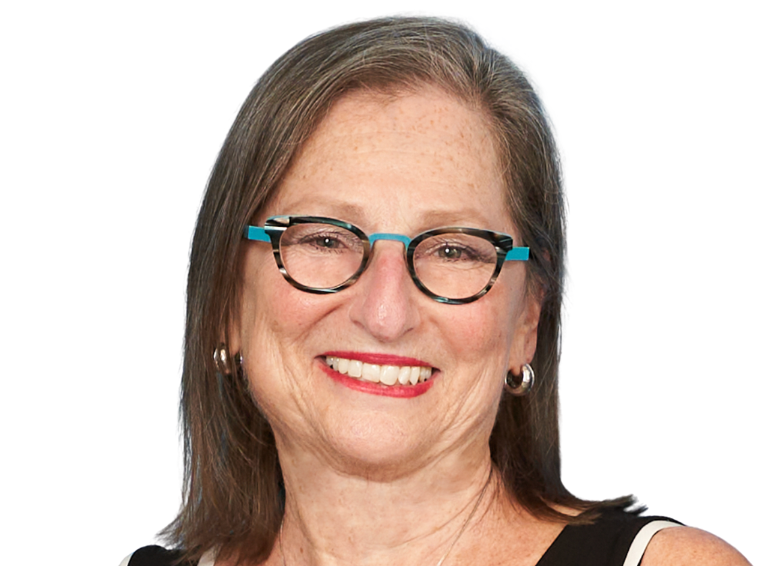
Elaine Goldstine admits to being “quite surprised” to have been nominated through Ben Carr’s office for the King Charles Award. Like Jessica Cogan, Goldstine has devoted most of her adult life first as a volunteer for the Federation and, over the past 20 years, as a senior member of our community’s “civil service”.
But her volunteer efforts go back even further. As noted in an earlier issue of the Post – in an interview with her two years ago – just prior to her retirement as the Federation’s CEO, as a teen, she was active in USY and was President of the Gabriels Chapter of BBYO. In 1979 she became involved with National Council of Jewish Women, and served as President of the Sarah Branch, President of the NCJW Winnipeg section, and as the organization’s National Treasurer and Vice President. She had also served on the PTA of Ramah Hebrew School, the Business and Professional Development Committee of Canadian Friends of the Hebrew University, and on the Board of the Shaarey Zedek Sisterhood.
She began volunteering with Federation after her two sons reached school age. She started as a volunteer with the CJA’s Women’s Philanthropy Division. After a short time, she was offered a job with the campaign. Eventually, she was hired to become the campaign division chair. She assumed the reins of the CJA campaign in 2004 after her predecessor, Gerry Koffman, passed away at a relatively young age.
In 2015, after the retirement of long time Federation CEO Bob Freedman – and a successor who left after a year – Elaine was tapped to become the new CEO.
Looking back over the course of her career serving our community, she feels a sense of satisfaction for a job well done – and gratitude for having had the opportunity.
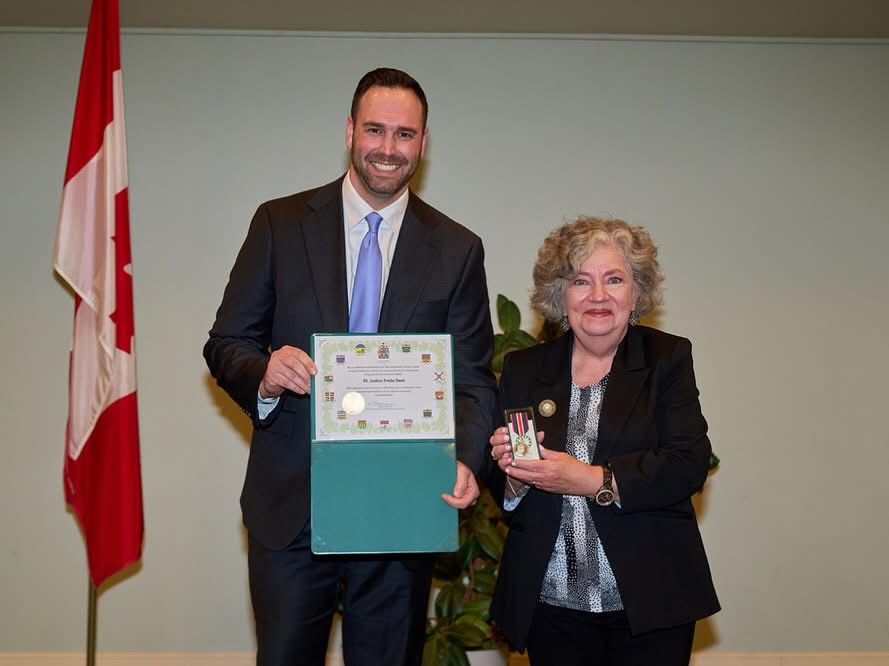
Madame Justice Freda Steel also notes that she was “surprised and humbled” to have been nominated to receive the medal which, she reports, was presented to her at Ben Carr’s office – along with some of the MP’s other nominees – on Monday, March 3. “I do not know who nominated me for the medal,” she says. “I just got a letter from Ben Carr’s office telling me I was a recipient of the medal and that the medal was for community service.“
As with Goldstine and Cogan, Steel has a long history of leadership in our Jewish community. She has been a board member and/or held leadership positions with the Federation, the Jewish Foundation of Manitoba, the Rady Centre, the Asper Jewish Community Campus and the Winnipeg Board of Jewish Education.
In her professional life, she has a Bachelor of Laws degree from the University of Manitoba and a Masters of Law from Harvard. For much of her career, she was a Professor of Law – first in Ottawa, then at her alma mater. She was appointed to the Manitoba Court of Queen’s Bench in 1995 and to the Court of Appeal in 2000. She stepped down from the court last year, but remains active as an arbitrator and mediator.
“My parents taught me that it was important to give back to your community and I have always tried to live up to the values that they inspired in all of us,” she says.
“I was honoured to be included along with so many accomplished individuals,” says Karen Dana, who was also one of Ben Carr’s nominees.
The daughter of Nate and Phyllis Dana was recognized for her lifelong contributions to the music scene in Winnipeg. A social worker by profession, Dana’s avocation has been folk music, primarily as a member of the organizing committee of the annual internationally-known Winnipeg Folk Festival. She began volunteering at the festival early on, serving for many years as backstage kitchen co-ordinator. As well, 30 years ago, she established an apprentice program for the festival, aimed at bringing in younger volunteers.
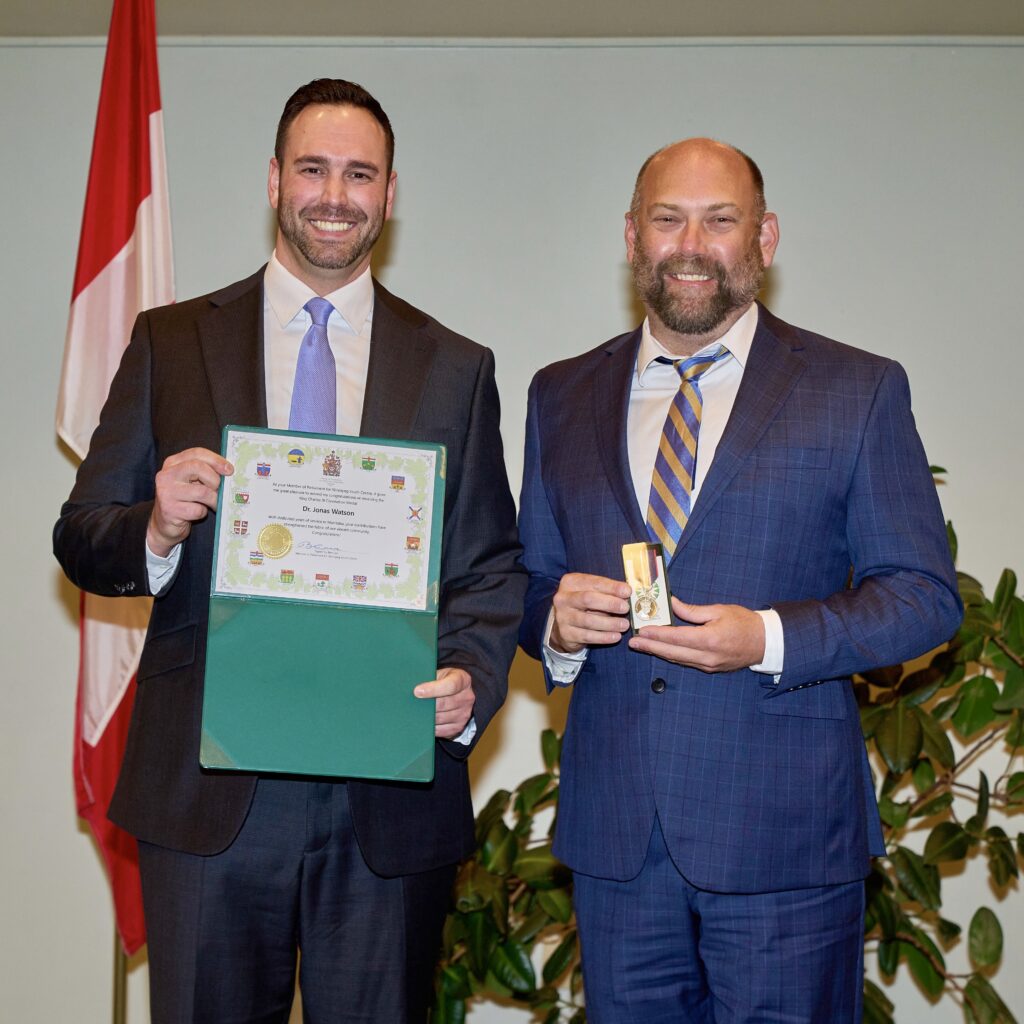
For veterinarian Dr. Jonas Watson, receiving the King Charles III Coronation Medal was “a tremendous honour”. he award, he notes, as presented to him in recognition for his leadership locally, nationally and internationally in animal health and welfare.
In a profile I wrote about Watson for this newspaper six years ago, the owner of Grant Park Animal Hospital in the rant Park Festival Centre on Taylor Avenue spoke about what he referred to as his philanthropic outreach was inspired, he recalled, by his participation in a spay-neuter clinic in the northern Saskatchewan community of Île-à-la-Crosse during his university studies where he saw first-hand the critical need for veterinary services in remote communities.
Among the initiatives he has led over the past few years are regular “0ne health” clinics up combining veterinarians and other healthcare professionals in neighbourhoods that have a disproportionately large number of vulnerably-housed or homeless people – providing vaccinations and deworming for their pets and dental care, flu shots and other services for the pet owners.
As well, he and his team regularly visit isolated parts of northern Manitoba and Nunavut to spay and neuter the dogs in these communities. And , farther afield, he has been recruited to provide his spay and neuter services to underserviced communities in Mexico and villages bordering national parks in the Indian Ocean island of Madagascar– to alleviate the dogs’ impact on endangered species – specifically lemurs,”
The graduate of the Hebrew bilingual program at Sir William Osler (now at Brock Corydon) elementary School points out that “an entire section of Jewish law- the concept of “tsa’ar ba’alei hayim”- prescribes that all animals be treated with compassion, and spared any suffering”.
”This notion has been the driving force behind everything I’ve done professionally over the last 25 years,” he says. “It is in fact the reason I pursued a career in veterinary medicine in the first place. And so, to be awarded this medal for what has been my life’s work is truly humbling. The fact that this work is being highlighted now is, I hope, a promising sign for the animals themselves.”
Among the most recent members of our community to have been awarded the Coronation medal is Dan Saidman, the Gwen Secter’s popular program director.
“I was really surprised,” says Saidman, who was presented with the award this past Saturday by Raquel Dancho, the Member of Parliament for Kildonan-St. Paul.
The honoree notes that he has been recognized for his work at the Gwen Sercter Centre over the past seven years. Previous to coming to the north Winnipeg seniors’ centre, he had served as director of BBYO for a time – followed by programming stints at the Waverley Retirement Home and the Heritage Lodge personal care home.
Saidman describes his time working at the Gwen Secter as the best job he has ever had. “It is a nice working environment and the staff and membership have been great,” he says.
A particularly notable honoree was the recently deceased Shawna (Shoshana) Forester Smith. I only learned about Smith – and her membership in our Jewish community when I was contacted by her husband, Brent, after my original report “Jewish Coronation medal recipients” was published int this paper in early January.
Some readers may be familiar with Smith’s name from the regular column she wrote for the Free Press in her role as an advocate for hospitalized patients like herself in long term care.
Shoshana and Brent became part of the Temple Shalom family about 15 years ago. “It was important to Shawna to explore her spirituality and find the right home and community for that aspect of her life and she found those things with Temple Shalom,” Brent recalls.
“I first met Shawna when I subbed for Rabbi Karen in the Intro to Judaism class at Temple Shalom in 2011,” he says. Longtime Temple Shalom president Ruth Livinston recalled standing beside Smith’s bedside at the Deer Lodge Hospital on the occasion of Smith receiving the Coronation medal . “We had a good connection right from the start. Besides attending services, Shawna came to study watercolour and the read Hebrew program with me, she painted a couple of kippahs and even came to a challah baking class. I had the honour of sitting on her Beit Din and helped her prepare for her Bat Mitzvah. She was a member of Temple Shalom’s Board of Trustees and managed our social media presence.
“When she decided to live at Riverview, she changed our weekly visits to include a watercolour class which she shared with her ward…that went on until Covid. We continued to meet weekly after Covid, including after her move here, to Deer Lodge. I treasure my visits with her – she had become family to me.”
In accepting the medal, Smith recounted her career in management for the Winnipeg Regional Health Authority until she became ill in her late 20s and had to go on permanent disability. Once she became a chronic care patient in the care of the health system, she used her public relations and healthcare background to advocate on behalf of patients with some success in bringing about positive change.
Sadly, Shoshana Smith passed away just about a month after receiving her Coronation medal. “Shawna is the bravest person I have ever met,” Livingston says. “In spite of ever increasing disability and agonizing pain, she made the decision to live to the best of her ability, to keep fighting for what she needs as well as for others.
“For one little woman with so many challenges, Shawna made an enormous and important impact on our community and beyond. I am thankful and delighted that she was honoured with the King Charles Coronation medal for her work in advocacy.”
Local News
Winnipeg Jewish Theatre breaks new ground with co-production with Rainbow Stage

By MYRON LOVE Winnipeg Jewish Theatre is breaking new ground with its first ever co-production with Rainbow Stage. The new partnership’s presentation of “Fiddler on the Roof” is scheduled to hit the stage at our city’s famed summer musical theatre venue in September 2026.
“We have collaborated with other theatre companies in joint productions before,” notes Dan Petrenko, the WJT’s artistic and managing director – citing previous partnerships with the Segal Centre for the Performing Arts in Montreal, the Harold Green Jewish Theatre in Toronto, Persephone Theatre in Saskatoon and Winnipeg’s own Dry Cold Productions. “Because of the times we’re living through, and particularly the growing antisemitism in our communities and across the country, I felt there is a need to tell a story that celebrates Jewish culture on the largest stage in the city – to reach as many people as possible.”
Last year, WJT approached Rainbow Stage with a proposal for the co-presentation of “Fiddler on the Roof.” Rainbow Stage management was really enthusiastic in their response, Petrenko reports.
“We are excited to be working with Winnipeg’s largest musical theatre company,” he notes. “Rainbow Stage has an audience of more than 10,000 people every season. Fiddler is a great, family-oriented story and, through our joint effort with Rainbow Stage, WJT will be able to reach out to new and younger audiences.”
“We are also working to welcome more diverse audiences from other communities, as well as newcomers – families who have moved here from Israel, Argentina and countries of the former Soviet Union.”
Helping Petrenko to achieve those goals are two relatively new and younger additions to WJT’s management team. Both Company Manager Etel Shevelev, and Head of Marketing Julia Kroft are in their 20s – as is Petrenko himself.
Kroft, who is also Gray Academy’s Associate Director of Advancement and Alumni Relations, needs little or no introduction to many readers. In addition to her work for Gray Academy and WJT, the daughter of David and Ellen Kroft has been building a second career as a singer and actor. Over the past few years, she has performed by herself or as part of a musical ensemble at Jewish community events, as well as in various professional theatre productions in the city.
Etel Shevelev is also engaged in a dual career. In addition to working full time at WJT, she is also a Fine Arts student (majoring in graphic design) at the University of Manitoba. Outside of school, she is an interdisciplinary visual artist (exhibiting her work and running workshops), so you can say the art world is no stranger to her.
(She will be partcipating in Limmud next month as a member of the Rimon Art Collective.)
Shevelev grew up in Kfar Saba (northeast of Tel Aviv). She reports that in Israel she was involved in theatre from a young age. “In 2019, I graduated from a youth theatre school, which I attended for 11 years.” In a sense, her work for WJT brings her full circle.
She arrived in Winnipeg just six years ago with her parents. “I was 19 at the time,” she says.
After just a year in Winnipeg, her family decided to relocate to Ottawa, while she chose to stay here. “I was already enrolled in university, had a long-term partner, and a job,” she explains. “I felt that I was putting down roots in Winnipeg.”
Etel expects to graduate by the end of the academic year, allowing her to focus on the arts professionally full-time.
In her role as company manager, Shevelev notes, she is responsible for communications with donors, contractors, and unions, as well as applying for various grants and funding opportunities.
In addition, her linguistic skills were put to use last spring for WJT’s production of “The Band’s Visit,” a story about an Egyptian band that was invited to perform at a cultural centre opening ceremony in the lively centre of Israel, but ended up in the wrong place – a tiny, communal town in southern Israel. Shevelev was called on to help some of the performers with the pronunciation of Hebrew words and with developing a Hebrew accent.
“I love working for WJT,” she enthuses. “Every day is different.”
Shevelev and Petrenko are also enthusiastic about WJT’s next production – coming up in April: “Ride: The Musical” debuted in London’s West End three years ago, and then went on to play at San Diego’s Old Globe theatre to rave reviews. The WJT production will be the Canadian premiere!
The play, Petrenko says, is based on the true story of Annie Londonderry, a young woman – originally from Latvia, who, in 1894, beat all odds and became the first woman to circle the world on a bicycle.
Petrenko is also happy to announce that the director and choreographer for the production will be Lisa Stevens – an Emmy Award nominee and Olivier Award winner. (The Olivier is presented annually by the Society of London Theatre to recognize excellence in professional London theatre).
“Lisa is in great demand across Canada, and the world really,” the WJT artistic director says. “I am so thrilled that we will be welcoming one of the greatest Jewish directors and choreographers of our time to Winnipeg this Spring.”
For more information about upcoming WJT shows, readers can visit wjt.ca, email the WJT office at info@wjt.ca or phone the box office at 204-477-7515.
Local News
Rising Canadian comedy star Rob Bebenek to headline JCFS’ second annual “Comedy for a Cause”

By MYRON LOVE Last year, faced with a federal government budget cut to its Older Adult Services programs, Jewish Child and Family Service launched a new fundraising initiative. “Comedy with a Cause” was held at Rumor’s Comedy club and featured veteran Canadian stand-up comic Dave Hemstad.
That evening was so successful that – by popular demand – JCFS is doing an encore. “We were blown away by the support from the community,” says Al Benarroch, JCFS’s president and CEO.
“This is really a great way to support JCFS by being together and having fun,” he says.
“Last year, JCFS was able to sell-out the 170 tickets it was allotted by Rumor’s,” adds Alexis Wenzowski, JCFS’s COO. “There were also general public attendees at the event last year. Participants enjoyed a fun evening, complete with a 50/50 draw and raffle. We were incredibly grateful for those who turned out, the donors for the raffle baskets, and of course, Rumor’s Comedy Club.
“Feedback was very positive about it being an initiative that encouraged people to have fun for a good cause: our Older Adult Services Team.”
This year’s “Comedy for a Cause” evening is scheduled for Wednesday, February 25. Wenzowski reports that this year’s featured performer, Rob Bebenek, first made a splash on the Canadian comedy scene at the 2018 Winnipeg Comedy festival. He has toured extensively throughout North America, appearing in theatres, clubs and festivals. He has also made several appearances on MTV as well as opening shows for more established comics, such as Gerry Dee and the late Bob Saget.
For the 2026 show, Wenzowski notes, Rumors’ is allotting JCFS 200 tickets. As with last year, there will also be some raffle baskets and a 50/50 draw.
“Our presenting sponsors for the evening,” she reports, “are the Vickar Automotive Group and Kay Four Properties Incorporated.”
The funds raised from this year’s comedy evening are being designated for the JCFS Settlement and Integration Services Department. “JCFS chose to do this because of our reduction in funding last year by the federal government to this department,” Wenzowski points out.
“Last year alone,” she reports, “our Settlement and Integration Services team settled 118 newcomer families – from places like Israel, Mexico, Brazil, and Argentina. Each year, our program supports even more newcomer families with things like case management, supportive counselling, employment coaching, workshops, programming for newcomer seniors, and more.”
“We hope to raise more than $15,000 through this event for our Settlement and Integration Program,” Al Benarroch adds. “The team does fantastic work, and we know that our newcomer Jewish families need the supports from JCFS. I want to thank our sponsors, Rumor’s Comedy Club, and attendees for supporting us.”
Tickets for the show cost $40 and are available to purchase by calling JCFS (204-477-7430) or by visiting here: https://www.zeffy.com/en-CA/ticketing/jcfs-comedy-for-a-cause. Sponsorships are still available.
Local News
Ninth Shabbat Unplugged highlight of busy year for Winnipeg Hillel

By MYRON LOVE Lindsay Kerr, Winnipeg’s Hillel director, is happy to report that this year’s ninth Shabbat UnPlugged, held on the weekend of January 9-11, attracted approximately 90 students from 11 different universities, including 20 students who were from out of town.
Shabbat UnPlugged was started in 2016 by (now-retired) Dr. Sheppy Coodin, who was a science teacher at Gray Academy, along with fellow Gray Academy teacher Avi Posen (who made aliyah in 2019) – building on the Shabbatons that Gray Academy had been organizing for the school’s high school students for many years.
The inaugural Shabbat UnPlugged was so successful that Coodin and Posen did it again in 2017 and took things one step further by combining their Shabbat UnPlugged with Hillel’s annual Shabbat Shabang Shabbaton that brings together Jewish university students from Winnipeg and other Jewish university students from Western Canada.
As in the past, this year’s Shabbat UnPlugged weekend was held at Lakeview’s Hecla Resort. “What we like about Hecla,” Kerr notes, “is that they let us bring in our own kosher food, it is out of the city and close to nature for those who want to enjoy the outdoors.”
The weekend retreat traditionally begins with a candle lighting, kiddush and a traditional Shabbat supper. Unlike previous Shabbats UnPlugged, Kerr points out, there were no outside featured speakers this year. All religious services and activities were led by students or national program partners.
The weekend was funded in part by grants from CJPAC and StandWithUs Canada, along with the primary gift from The Asper Foundation.
Kerr reports that the activities began with 18 of our local Jewish university students participating in a new student Shabbaton – inspired by Shabbat Unplugged, titled “Roots & Rising.”
In addition to Shabbat Unplugged, Hillel further partnered with Chabad for a Sukkot program in the fall, as well as with Shaarey Zedek Congregation and StandWithUs Canada for a Chanukah program. Hillell also featured a commemoration of October 7, an evening of laser tag and, in January, a Hillel-led afternoon of ice skating.
Coming up this month will be a visit to an Escape Room – and a traditional Shabbat dinner in March.
Kerr estimates that there are about 300 Jewish students at the University of Manitoba and 100 at the University of Winnipeg.
“Our goal is to attract more Jewish students to take part in our programs and connect with our community,” she comments.



